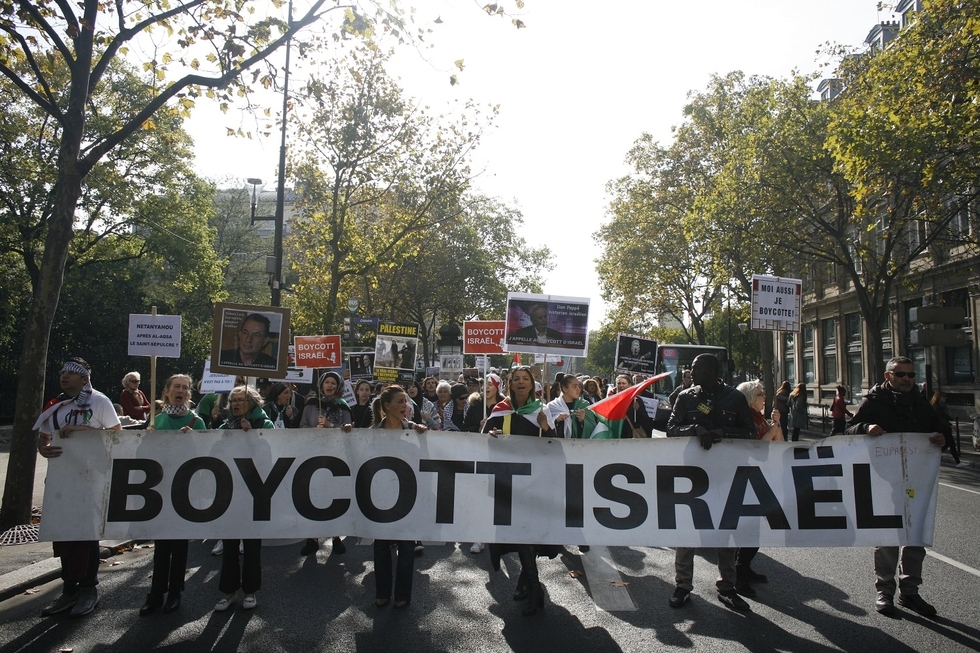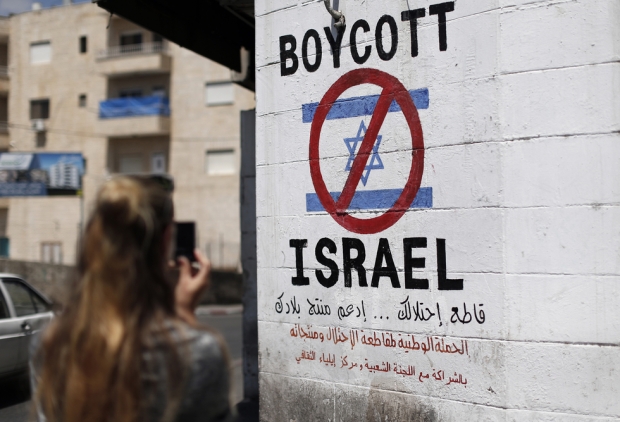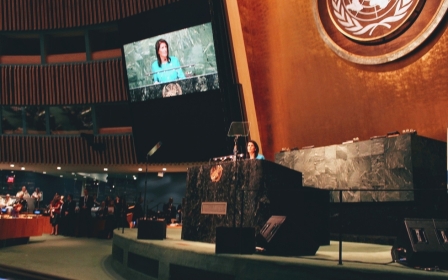Calling for a boycott of Israel is not anti-Semitic

The Dutch chapter of the Boycott, Divestment, Sanctions (BDS) movement recently asked me to write an essay for Art, Solidarity and Palestine, a day of conferences and debate about the pros and cons of an Israeli boycott due to be held on 29 November, the United Nations International Day of Solidarity with the Palestinian People.
Although I was flattered to be asked, I must admit I had to think twice before doing so. Some friends actually advised me not to. To support or call for an Israeli boycott is no small matter these days. Before you know it, you are labeled an anti-Semite. Or worse.
A criminal offence
In France and some parts of the US it is considered a criminal offence. In March, a group of 43 US senators introduced the Israel Anti-Boycott Act, which would make it a nationwide felony with a maximum penalty of $1m and 20 years in prison. As a comparison, the maximum penalty for rape in the Netherlands is 12 years.
Seeing the sensitivities at play, I figured it would do no harm to check if writing anything could get me in trouble. When it comes to the Netherlands, former foreign minister Bert Koenders in May 2016 stated that the Dutch government does not support an Israeli boycott, yet calling for one is protected by freedom of expression and freedom of assembly.
And, although the newly appointed government took a turn to the right, that position is unlikely to change.
In implementing its right to self-determination, should Israel not be held to the same basic principles of freedom and equality as any other self-professed democracy?
One should know that freedom of speech is holy in the Netherlands. It is the main platform for the country's right-wing politicians to throw their insults at (Muslim) immigrants. To now make an exception for the call to an Israeli boycott would not only be inconsistent, it would arguably not hold up in court.
Having said that, the Netherlands is also one of 31 states that endorsed the International Holocaust Remembrance Alliance's (IHRA) non-binding working definition of anti-Semitism.
At first sight, there seems nothing wrong with that. "Anti-Semitism is a certain perception of Jews, which may be expressed as hatred toward Jews," the IHRA states.
"Rhetorical and physical manifestations of anti-Semitism are directed toward Jewish or non-Jewish individuals and/or their property, toward Jewish community institutions and religious facilities."
The IHRA goes on to offer a series of examples, including blaming the Jews for the death of Jesus, accusing them of being behind the ills of the world, or conspiring to take over, as well as any kind of Holocaust denial. Impossible to disagree with any of that, I would say.
Problematic definition of anti-Semitism
However, the IHRA's working definition becomes problematic when it states that "contemporary examples of anti-Semitism in public life" include "denying the Jewish people their right to self-determination, eg, by claiming that the state of Israel is a racist endeavour".
This I do not understand. It is an undeniable fact that Israel's Arab citizens, who constitute one-fifth of the population, do not enjoy the same rights as their Jewish counterparts. If someone chooses to qualify this "Israeli inequality" as discriminatory, racist or even apartheid, how does that fundamentally deny the "Jewish people" the right to self-determination?
In implementing its right to self-determination, should Israel not be held to the same basic principles of freedom and equality as any other self-professed democracy?
It speaks for itself that the picture does not get any rosier were we to include the Palestinians living under military occupation in the West Bank, which today is home to some 500,000 Israeli settlers.
The South African system of racial segregation was eventually abolished in 1991, while the nation continues to exist
The US State Department goes much further than the IHRA. Influenced by such pro-Israel organisations as the Anti-Defamation League, its definition of anti-Semitism includes "denying the Jewish people their right to self-determination, and denying Israel the right to exist".
This is a highly problematic formulation, as it somehow equates the notion of the Jewish people's right to self-determination with Israel's right to exist. As if one could not exist without the other.
Yet, one may acknowledge, say, the Kurds' or Catalans' right to self-determination, without supporting their call for a Kurdish or Catalan state.
These factors have reduced the much-discussed two-state solution to a meaningless slogan and are an obstacle to Palestinians implementing their right to self-determination.
BDS goals
What's more, I believe that the current right-wing Israeli government is unwilling to make any concessions. On the contrary, its aim is to fully incorporate what it refers to as "Judea and Samaria". Add to that the support Israel enjoys in Washington and the American power of veto in the UN Security Council, and I do not see any changes for the better coming from that direction.
Hence, a call for a cultural and/or economic boycott is not unreasonable and certainly not anti-Semitic. After all, the stated goals of the BDS are clearly political, namely an end to the Israeli and settler colonisation of Palestinian lands and the Golan Heights, full equality of Palestinian citizens within Israel, and the right of return of Palestinian refugees.
Perhaps a comparison with other boycotts is helpful. When France did not support the 2003 invasion of Iraq, there was an open call in the US not to buy French products. Not because of some deep inner hatred towards the French, but because of their politics.
Replace France with Israel. Would the call not to buy Israeli products then be considered anti-Semitic?
The boycott of South Africa started in England in 1959 with a call upon British consumers “to withdraw support from apartheid by not buying South African goods”. No one ever denied the South Africans as a people the right to self-determination nor South Africa as a country the right to exist.
Coincidentally, “apartheid” is a Dutch word. Not a legacy to be proud of and arguably one reason that the anti-apartheid movement was very active in the Netherlands. May it be a reminder for people on all sides of the Israeli boycott divide that the South African system of racial segregation was eventually abolished in 1991, while the nation continues to exist.
Peter Speetjens is a Dutch journalist who lived in Lebanon for 20 years. He was a correspondent for Trouw and De Standaard, and wrote and co-directed the documentary 2000 Terrorists. He regularly travels to India and has a special interest in how 19th-century writers helped shape today’s conceptions of the Orient.
This views expressed in this article belong to the author and do not necessarily reflect the editorial policy of Middle East Eye.
Photo: People take part in a pro-Palestinian demonstration in Paris in October 2015 (AFP)
New MEE newsletter: Jerusalem Dispatch
Sign up to get the latest insights and analysis on Israel-Palestine, alongside Turkey Unpacked and other MEE newsletters
Middle East Eye delivers independent and unrivalled coverage and analysis of the Middle East, North Africa and beyond. To learn more about republishing this content and the associated fees, please fill out this form. More about MEE can be found here.







